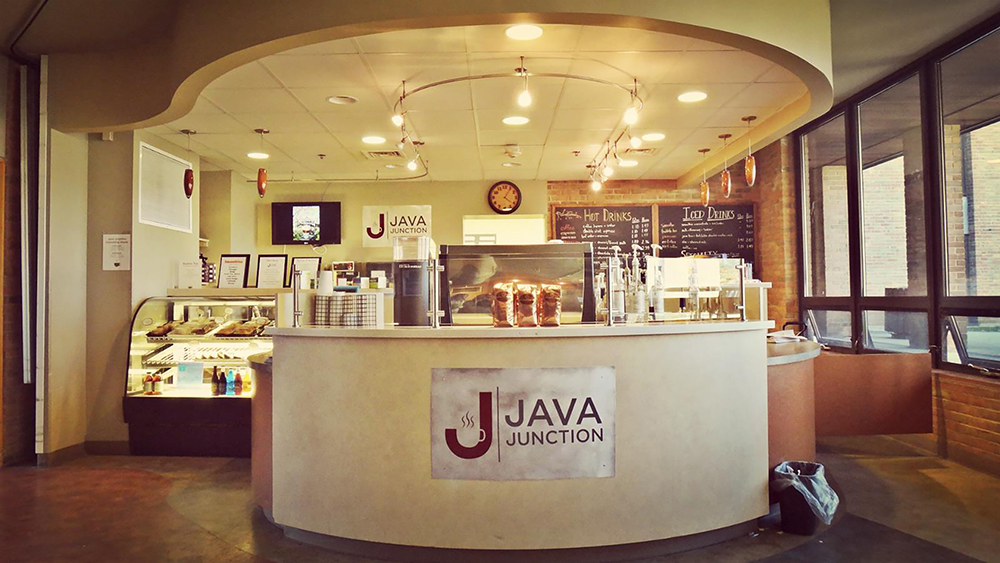It’s hard to imagine Goshen College without being able to make a late night trip to Java Junction for a its best selling product: milkshakes.
“Even on a day of six degrees students still want to drink milkshakes,” said Michelle Horning, who has been teaching the Java Junction Management class since it first began.But it was only three years ago when milkshakes weren’t even on the menu, and fourteen years ago when the coffee shop didn’t even exist.
Back in 2004, when The Connector and apartments were first built, Java Junction was just a student lounge. Coffee shops were on the rise in the U.S. and the college decided to have one of its own on campus.
Student life decided to offer Java Junction to the Business department as a way to provide the students with a hands on learning experience of running a business.
“It’s attractive to employers.” Horning said.
“I’ve had lots of students who have been on the management team in previous years tell me that it’s such an enchantment to their resume,” she said. “They’re surprised how much of their job interviews were focused on their work at Java Junction.”
“Java provides unique, real world situations,” said current manager, Austin Weaver who is experiencing his second semester on the team. “Throughout my work experience I’ve applied a lot of the skills in decision-making and problem-solving that I have acquired from Java management.”
During the Java Junction Management class, Horning is able to ask the team lots of questions, as well as offer resources and suggestions of what has and hasn’t worked in the past.
“I kind of joke that my role is a responsible adult,” Horning said, “to make sure that Java continues year after year and that we don’t do anything that would jeopardize that. But otherwise they’re actually in charge.”
Horning explained that the students are responsible for “everything that you would think a business would need to do.”
“They do all the accounting work, all the purchasing, all the marketing and work with employees – whether that’s hiring, training or evaluation.”
“Any student is welcome to sign up for the class,” Horning said, “you don’t have to be a business major.”
Due to its unique relationship with the business department, Java has gained the attention from other colleges and universities who have contacted Horning after learning about it.
“I’ve helped a couple of other schools get theirs started.” She said. “Usually just with providing some ideas or a sort of history.”
Over the years Horning has seen many changes to the menu of Java.
“When we started we had 11 drinks on the menu and no food, so we started very very small,” she said.
But the most significant change was adding milkshakes to the menu.
“It started as an accident,” Horning said, “and the fact that we’re still selling them is somewhat unplanned.”
Three years ago, Java hosted a special weekend event. It was open until 2 a.m. on a Friday and Saturday and food items that they didn’t usually sell where offered, along with milkshakes.
“They were such a hit that students kept asking about the milkshakes,” said Horning, “The team kept saying ‘no it was just for that one weekend, it was just for that weekend.’”
Horning explained, how eventually the team started getting frustrated about the whole situation. “They had kind of held firm to this idea that ‘well we’re a coffee shop, coffee shops don’t sell milkshakes.’”
“I said, you have two choices: you can either stick to that and say ‘we’re a coffee shop. We don’t sell milkshakes.’ Or you can give your customers what they want and sell milkshakes…’ and so they decided to do it.”
“I remember that we even remarked that how silly it was, that out of all the times of the year, we were introducing milkshakes in the dead of winter,” she said. “Every now and then we stumble upon something that’s really popular but never anything that’s turned out to be like milkshakes.”
One of Horning’s personal favorite Java related stories is of two students who credited their marriage to Java Junction.
“They were students from two different majors, never had met each other before and were then on the same team of students running the business,” said Horning. “They started dating and then they got married…. they don’t think it would have ever happened without Java Junction.”
After 14 successful years, Java continues to serve the college community. Looking toward the future, Horning and the management team continue to brainstorm on how to improve the service.
“I wish we could support more hours for Java Junction,” Horning said. “The problem we’ve not been able to solve in 14 years is how to get more students to go to Java Junction on Friday and Saturday nights… I’d love to have more hours if we could justify it.”



